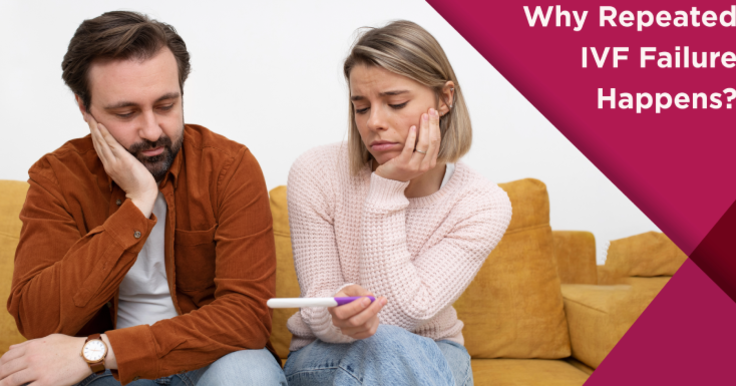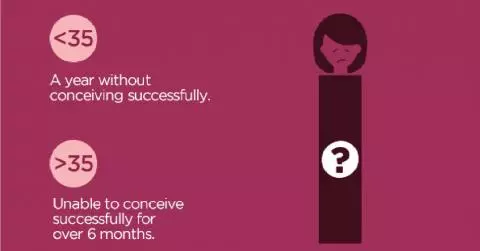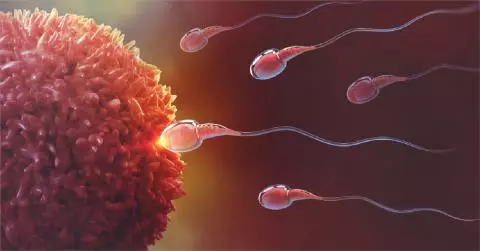Why Does Repeated IVF Failure Happen? Reasons for IVF Failure Explained

Facing one or more unsuccessful cycles of IVF is devastating and frustrating. When a couple fails to achieve pregnancy following several cycles of IVF after using three good embryos are known to be going through a recurrent or repeated implantation failure.
There lots of myths and misconceptions associated with IVF. Before discussing the actual cause of IVF failure, let’s take a look at the myths surrounding IVF and the contrasting facts:
Myth #1: Young People are Not Affected by Fertility Issues.
Fact: False.
Though, it is true that with age the fertility of person decreases. But there are factors like, congenital issues, hormonal imbalances, genetic mutations, etc. that leads to infertility even in young people.
Myth # 2: IVF Treatment Can Fix All Type of Infertility Issues
Fact: False.
There are lots of other treatment options depending upon the cause of infertility. Ovulation induction using medications and intrauterine insemination are some of them.
Myth #3: Herbal Remedies Help in the Success of IVF
Fact: False.
There is no scientific research to prove that herbs are safe to use during IVF treatment.
Myth #4: Healthy People Cannot Be Affected by Fertility Issues
Fact: False.
If someone gets unfortunately struck by infertility, it does not always mean that their lifestyle habits and regimens were to be blamed.
Myth #5: IVF Always Leads to Multiples
Fact: Maybe in Some Cases.
Though the chances of multiples pregnancies are higher through IVF, it can be reduced by reducing the number of embryos transfer, which is possible in young females.
Myth #6: Bed Rest after the Embryo Transfer is a Must
Fact: False
After the stay at the recovery room, one can go about their usual routine. Though, intense exercises and workouts are not advised.
Causes of repeated IVF failures are:
Poor Oocyte Quality
A healthy egg gives birth to a healthy embryo. Any abnormalities in the egg can result in a chromosomally abnormal embryo. Egg after fusing with the sperm plays a major role in cell division and chromosomal duplication to form an embryo.
As the oocyte or eggs ages, the spindle apparatus or the structure that is responsible for chromosomal separation and equal distribution becomes prone to breakage. This leads to an abnormal or anomalous distribution of chromosomes which results in the formation of a chromosomally abnormal embryo.
As a woman ages, the free radicals or the reactive oxygen species in her body increases. These free radicals present in her ovaries, react with her eggs causing damage to its DNA and thus reducing its quality.
Poor Sperm Quality
Abnormalities in the sperm may lead to an unfertilized egg. There are three major roles of a sperm: to reach the egg through the fallopian tube, penetrate through the outer membrane of the egg and release half of its genetic material or the sperm DNA to produce an embryo. So it is important to select the best quality sperm under high magnification during IVF for successful fertilization.
Sometimes even a high-quality sperm that is chromosomally normal may lack enzymes required to break through the zona pellucida or the outer shell of the egg. Low quality, morphologically abnormal and less motile sperm may not be able to reach the egg to fertilize it.
Wrong Embryo Selection
Embryo selection plays a crucial role in a successful implantation. It is a natural function of the uterus to reject the embryos that are abnormal. This means the chromosomally abnormal embryo cannot survive and it results in implantation failure or miscarriage. Sadly, it’s difficult to morphologically distinguish chromosomally normal embryos from the abnormal ones. So, an investigation of embryo health is important for a successful pregnancy.
Uterine Issues
A successful implantation also depends on the endometrial environment. There are various structural, hormonal and immunological factors that affect an ideal uterine environment.
Structural uterine factors such as the abnormal shape of uterus, fibroids, polyps, scarring, difficult cervix and intrauterine adhesions can lead to an implantation failure.
Other main uterine issue includes a thin endometrium due to an early rise in the progesterone prior to the egg retrieval in an IVF cycle.
Issues with Maternal and Paternal Health
Both paternal and maternal health matters in the success of an IVF pregnancy. Consumption of alcohol, smoking, and drugs can lead to lots of complications during implantation and pregnancy.
Improper management of systematic diseases like diabetes and hypertension and an unhealthy body weight also results in IVF failures.
Autoimmune disorders such as antiphospholipid syndrome and blood clotting disorders can lead to miscarriages.
Problems with Embryo Transfer
The embryo transfer is a non surgical procedure and is very sensitive . Any alteration in this procedure may lead to the failure of an IVF cycle. It is very important that the embryos are placed at the right location in the uterus. Without performing a trial transfer, it is difficult to find the optimal location for the embryo placement.
 Infertility Counselling
Infertility Counselling Female Infertility Treatment
Female Infertility Treatment Andrology Treatment
Andrology Treatment Fertility Enhancing Surgeries - Female
Fertility Enhancing Surgeries - Female Fertility Enhancing Surgeries - Male
Fertility Enhancing Surgeries - Male Endoscopy Treatment
Endoscopy Treatment IUI Treatment
IUI Treatment IVF Treatment
IVF Treatment ICSI Treatment
ICSI Treatment Advanced IVF Solutions
Advanced IVF Solutions Embryology
Embryology Vitrification Egg, Embryo, Sperm Freezing
Vitrification Egg, Embryo, Sperm Freezing Preimplantation Genetic Testing (PGT)
Preimplantation Genetic Testing (PGT) Donation Program Embryo / Egg / Sperm
Donation Program Embryo / Egg / Sperm Self-cycleTM IVF
Self-cycleTM IVF

 Self-cycleTM IVF
Self-cycleTM IVF









